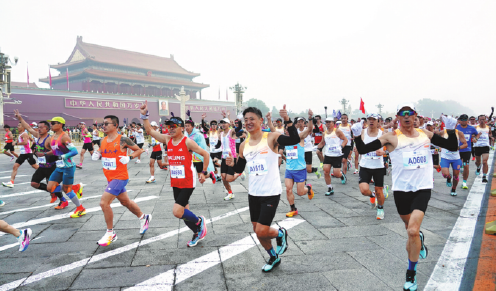

Mass sports events offer areas the chance to boost tourism revenue.
As a marathon craze sweeps China, driven by a growing focus on healthy living, host cities are seizing the opportunity to showcase their attractions and offer incentives to boost tourism.
In 2023, the Chinese mainland hosted 699 large-scale road-running events — those involving more than 800 participants each — with the total number of participants exceeding 6 million, according to the Chinese Athletics Association.
The number of such races, along with cross-country and hiking events, surged from 328 in 2016 to 1,828 in 2019, with participants rising from 2.8 million to 7.12 million.
"I find joy in the rhythm of my breathing and the scenic views while running, rather than focusing solely on the results," a 26-year-old marathoner from Beijing told China Tourism News.
Li Jun, a runner from Hubei province who participated in the 2024 Qionghai Boao Marathon in December in Hainan province, said marathons offer excellent opportunities to explore different cities.
"The route (of the Qionghai race) is quite unique, being along the seaside. It will surely be an unforgettable experience," Li told Hainan Daily before the event. Li said he also planned to tour local attractions such as the Baishi Ridge and the Guantang Hot Springs.
Marathons not only serve as competitive arenas but as platforms for cities to showcase their tourism resources and local cultures.
The 2024 Beijing Marathon, starting from Tian'anmen Square, saw more than 30,000 runners passing landmarks such as the West Chang'an Avenue, Xidan commercial area and Olympic Park.
The 2024 Zhengzhou Marathon connected historical and modern landmarks such as the Qianxi Plaza, the Zhengzhou International Convention and Exhibition Center, and the Erqi Memorial Hall. Along the way, kung fu performers and Yuju Opera actors in traditional costumes cheered on the runners, showcasing the city's rich cultural heritage.
Cities hosting marathons are also offering exclusive benefits to participants in a bid to transform them into tourists.
The Qionghai Boao Marathon provided participants with race supplies along with local delicacies, including mixed grain cakes and hot spring goose.
Participants in the 2024 Nanjing Marathon were offered free public transportation and complimentary visits to 16 popular attractions. Hotels introduced late checkout services for runners.
One participant, Liu Yu, told China Tourism News: "My friends and I were pleasantly surprised by the exclusive benefits. We plan to stay in Nanjing for a few more days to explore the city."
Marathons are embracing innovation by integrating technology. The 2024 Hangzhou Marathon introduced four-legged robot pacesetters known as "mechanical rabbits". The 2024 Chengmai Half Marathon utilized big data, GPS tracking and other technologies for real-time route monitoring.
Zheng Qunming, vice-dean of the College of Tourism at Hunan Normal University, suggests that cities plan marathon events with a long-term vision.
"Future marathons will focus on deeper integration with the cultural and tourism sectors. Organizers should innovate, enhance the event experience, and develop cultural and tourism products related to marathons, such as themed cultural and creative products, tour routes and exhibitions, so that more runners will choose to visit a city for the sake of participating in a race," he told the Beijing-based newspaper.
huyuyan@chinadaily.com.cn